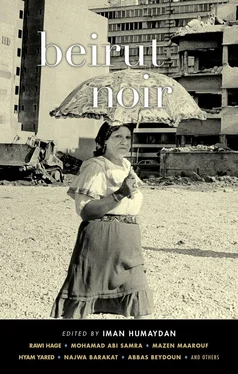The scent of the Beirut evening was strange, the scent of passersby clung to me. It was not the scent of people’s exhaustion and their old sweat; instead the scent resembled that of dead bodies, the scent of death which emanates from their faces and eyes. In the evening, I wanted to explain this to my friend, but I was afraid that he’d call me crazy or tell me go to a nose doctor — “Perhaps your sense of smell needs curing” — so I didn’t say anything to him. When I awoke to that very same scent in the morning, my fear grew — perhaps the smell of Beirut had changed, but I didn’t want to believe it. Or perhaps the scent was emanating from me.
I observed myself in the bathroom mirror, the scent rising from my face and sticking to the glass like vapor. I thought at first that my breath had stuck to the mirror. I wiped it with my sleeve but the vapor returned to fog it up. I couldn’t see the full reflection of my face; my features were obscured by the vapors of death on the mirror, resembling the death in the city, and resembling the scent of yesterday’s passersby. I tried to convince myself that the problem resided in my nose.
Then I tried to ignore the whole thing, as I had gotten used to facing my problems with instant forgetfulness, but that didn’t help either. I kept telling myself that perhaps I was imagining everything. But I kept hearing my mother’s voice repeat: The crime didn’t happen in that place.
Through practice, I started forgetting the whole war, not even believing it. Whenever I want to forget something, I sleep. Similarly, whenever it wants to forget, Beirut sleeps.
Sometimes it seems to me that the war didn’t happen. One day city people grew bored of peace, and since they liked to forget, they went to sleep. The city started sleeping on the night of April 13, 1975, and all the people dreamed of war.
It was perhaps the first time in history that thousands of people shared a single dream.
It was really quite strange. I used to always say that to my friend.
“Oh girl, when will you grow up?” he would say, smiling. “What came before the war was a dream, my dear.”
But I didn’t believe him, because I’m more than a thousand years old, if we’re following the Islamic calendar. He smiled again when I said that to him. Then he said, “Why isn’t the dream that old?”
Of course, I didn’t sleep through all those centuries. But my grandmother told me I was born dead, that I was murdered at birth all those years before by my grandfather’s grandfather.
Why he killed me at birth I don’t remember.
My grandmother says that the past is our roots and that the murder of women and girls in infancy is an open secret throughout our land.
But another friend informed me about a woman whose father killed her in childhood because she was too beautiful. She was four years old and looked as if she appeared from a fairy tale. He feared that someone would rape her and so he decided to kill her first.
I grew anxious when she told me this story. She continued, “Perhaps he was afraid of his desire for her — do you think that desire can lead to murder?”
I didn’t answer. I thought, I’m not beautiful. So then why did my ancestor kill me in infancy years before? I don’t remember. But I remember that I was afraid he would kill my sister’s daughter when she was born in the hospital. We didn’t know if my sister would have a boy or a girl, and I waited impatiently and anxiously throughout her labor.
The nurse came out and walked right by me without saying anything so I grew even more worried. I walked up to her and asked, “Is it a boy or a girl?” But she didn’t answer. So I asked another nurse nearby. She looked at me and didn’t answer either. I thought that something had happened to my sister.
I lost it. I stormed into the operating room and asked the doctor. He said, “It’s a girl.” I informed my mother. She said that the nurse was right, the person who informs someone about the birth of a girl shames herself before God for forty days. The nurse who hadn’t replied to me still had a look of shame on her face.
My sister was as beautiful as the white rose on her bed. But I remain full of shame. My mother told me that the news report said that the woman was found dead with her limbs cut off. The security forces’ said that the corpse was unidentified. The incident was believed to have taken place elsewhere. I told her, “Strange. Are you sure?”
She said that the news reported it. With a curious expression, she added, “If the girl hadn’t done anything, no one would have killed her.” Then she continued, “What’s wrong? You don’t look right. You look ashamed.”
I didn’t answer. I turned my face from her and peered out the window, once again feeling ashamed.
The scent kept filling my nose; I thought that it was coming from my mother.
My mother’s scent was like that of Beirut today, neither that of the village nor of the city. I remember that my grandmother’s scent was different — perhaps it was the scent of the village. I used to be able to distinguish the scent of her house from that of all other houses. I remember when I was young, the beautiful scent would fill my nose upon merely entering her house. I used to search through her little room to try to figure out the secret of her scent, but I never could. I thought about this a lot. I asked her about the secret to her house’s scent, and she would smile and lift the scarf up off her face and her red cheeks, a trace of beauty and a halo of light and goodness bringing fragrance from between her eyes.
Today I see many women covering their heads like my grandmother did, but I don’t smell her scent on them when they pass me. I don’t smell the scent of love that used to waft from my grandmother’s face. I smell a scent of hatred.
Her face was as open as her heart and the scent of her house was a boundless scent of serenity. I didn’t know the secret in the beginning, or its explanations weren’t clear to me. Now I realize that it was the scent of eighty years in the house. A delicious scent that radiated from her face and the yellow calicotome flowers in her hands. The scent of her generous eyes. I still know that scent even now.
The scent is a secret.
The secret is that I smelled the scent of a woman one day, crossing Hamra Street. More than two years had elapsed since my grandmother had passed away, and for a flash of a second I thought she was still alive.
I followed the scent and I followed the woman. She grew afraid and quickened her footsteps. I walked faster too but I still couldn’t glimpse her face. Her scent filled the street. I kept getting closer to her, she was rushing and I was rushing, then she started to run. I forgot everything and ran after her, but then she disappeared among the passersby. Her scent remained in the street though. I was really sad because I’d lost her. When I told my friend about it, she advised me to visit the doctor right away. Then I was even sadder, because she didn’t understand me.
I was even sadder yet when I left the street in the heavy rain. The storm twisted around Beirut and made the scent of trash rise in the street. The trash scent was strong in the evenings, when my friends and I would careen all around the city in a car, laughing. The refuse of one street is different from that of every other street. My friend said that nature was also found in the scent of garbage. The scent in this street seemed profound. The wind stirred up leftover bits of food into the air, then we moved to another street where groups of people who are always fighting each other live.
My friend observed, “These two groups of people are only united by the scent of garbage.” When we crossed into a posher area, he said, “This is the scent of bourgeois trash.” We laughed until we almost died... either of laughter or of that scent.
Читать дальше












